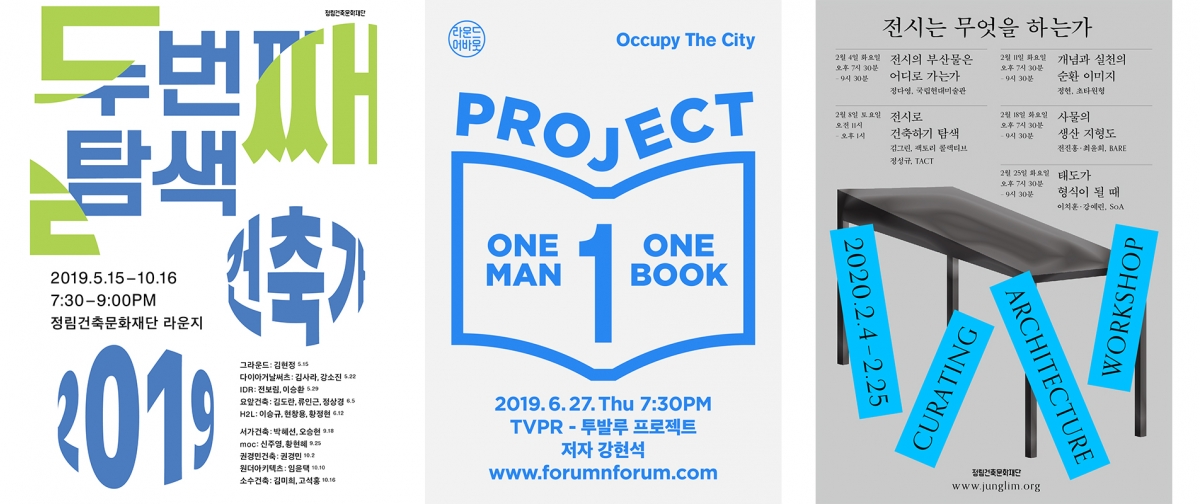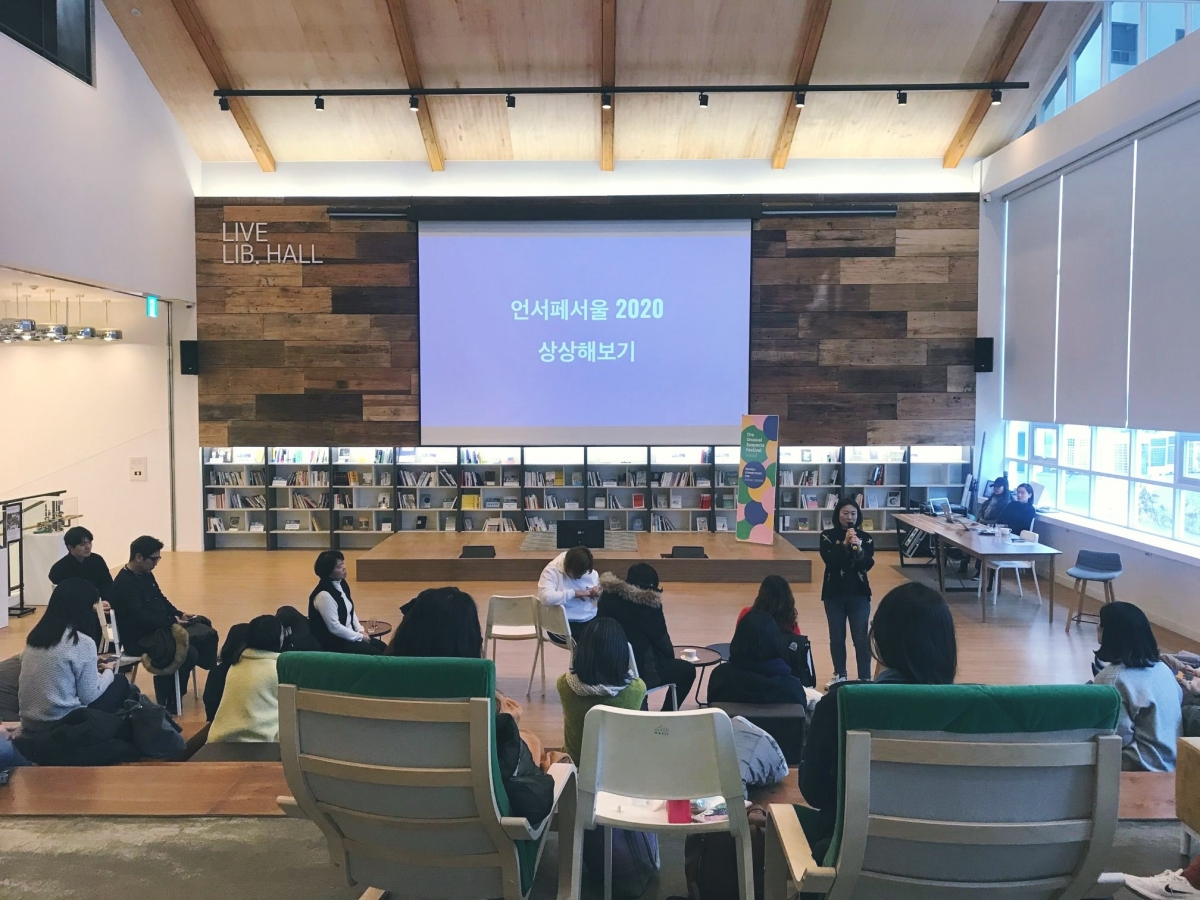Junglim Foundation Forum
Leader | Kim Hyoungkook
Member | Park Seongtae, Kim Sangho, Yoon Soyoung, Kim Bohyun
Period of Operation | 2011. - in progress
Main Programme | forum, book talk, workshop, seminar, education
Operational Aims | To become a balanced mediator for Korean architectural culture, operating a range of topic forums linked to exhibitions, publications, research, and education.
Website | www.junglim.org

Posters of Junglim Foundation Forum
Kim Sangho chief, Junglim Foundation Forum × Bang Yukyung
Bang Yukyung (Bang): How did the Junglim Foundation Forum begin? What is the difference between other platforms in the architectural world?
Kim Sangho (Kim): It was launched as a part of the media business simultaneously with the establishment of the Junglim Foundation. In 2011, when the Foundation Forum began, the architectural world was not opening many events and meetings. The only steady meetings I remember at that time were the Yongchoo Forum and the Fragrance of Land, House, and People. What makes them different from the Foundation Forum, which opens more events nowadays, is diversity and continuity.
Bang: Who is operating the Foundation Forum, and how is it planned and directed?
Kim: The Foundation Forum is open to anyone becoming its operator. The Foundation wants to become an open platform within the architectural world. This is true not only in the Foundation Forum, but across all fields of the Foundation's business. There are things that no individual or organisation can perform alone, and this goes for the Foundation. It is open as a platform that allows anyone to open a collective forum, publish a book, or open an exhibition if one has a project to perfrom or something to try. The 2018 Venice Biennale, the curating architecture workshop (CAW) preparing for its fourth season, and the upcoming Junglim Architecture Archive project were also realised through collaboration with each participant. Although the Foundation has limited resources, flexible networking with the architectural world can expand to cloud resources.
Bang: How is the Foundation Forum connected to other programmes run by the Foundation?
Kim: Basically, publication, exhibition, and forum are all interlinked in the Foundation. The three are set up together from the planning stage in most projects. The biggest strength of the forum seems to be its liveliness, and the weakness is its volatility. Publication is added to compensate for this volatility. Exhibitions are also temporary as a medium, so the catalog publication is not optional, but indispensable part. We organize a forum by keeping exhibition planning and research process open to the public, and actively apply a forum to the research and coverage process required for publication. All of them are just a kind of tools or formats, so naturally we select and combine them as needed.
Bang: What are the values and attitudes pursued by the Foundation Forum for the popularisation of architectural discourses?
Kim: It can be said that the Foundation Forum has entered its second stage. We also changed our goals slightly. In terms of architectural discourse, we are placing emphasis on ensuring internal stability rather than popularisation. In other words, we are focusing on upgrading the level of discourse for popular mainstream reception. We are trying to rearrange the subjects of our discourse and adjusting subjects, focus, and, if possible, even formats. For similar reasons, we do not separate professionalism from popularity. I think that the public who pay attention to architecture want comprehensible expertise, not superficial popularity.
Bang: What makes the Foundation Forum sustainable? What do you expect from this as a place for education, sharing, and public opinion?
Kim: The source of the Foundation Forum is awareness of the problems. We keep our radar on by asking questions to find issues in the architectural world, filling gaps, resolving imbalances, and exploring other possibilities. We do not want to open forums for the sake of forums or events for the sake of events. I think the role of the Foundation Forum is to share and solve the critical resolution brought to the public debate with the architectural world and society.

The Unusual Suspects Festival Seoul, collaborator meeting
The Unusual Suspects Festival Seoul
Leader | Han Sungkyung (C.)
Period of Operation | 2018 - in progress
Main Programme | networking festival, discussions, lectures, workshops
Website | usfseoul.com
Launched in London in 2014 by SIX (Social Innovation eXchange) of the UK, the 'Unusual Suspects Festival' is a series of events to open dialogues about community and society between its participants. It aims to share ‘unusual’ topics that are not easy to broach and to encounter those who respond to them. The aim can be explained in the motto ‘Dialogues to identify differences between boundaries and domains, and to understand and spread empathy so that concentric circles of small but various wavelengths can be created in society’. The 'Unusual Suspect Festival Seoul' (USF') was first held in October 2018 by C., the Seoul-based partner of SIX under the title of 'Unexpected Dialogue', and the next USF were held in December 2019 for 3 days in 19 places in Seoul with 53 collaborators (co-participants) under the main theme of 'Inclusive City'.
The reason for introducing USF here is connected to the reason behind inviting the Junglim Foundation; architecture is a very ‘unusual’ field. The C., which organised the USF events, contacted the foundation expecting that it would become a link to the architectural world. Repeated meetings made them realise their differences, and the foundation was in deep trouble regarding how best to detect the clues in the relationship. At first, the foundation wanted to play the role of providing space to other co-participants and advising on the spatial layout and the arrangement of the event venues from the perspective of a passive observer as opposed to creating a unique event, but it had to face physical and temporal limitations. Nevertheless, it noted a lot of possibilities at every point. For example, the following examples are of the synergy that can occur when they are connected to appropriate points within the architectural world: a team struggling to realise a 'Supported Housing' project in SH Corporation, which is notorious for its commercial practices in landscaping and housing; the world of the 'Children of Deaf Adults' communicated through director Gilbora Lee, who was raised as a child of a deaf couple; Dark Matter Labs which is looking for breakthroughs in social transformation through a means known as 'System Thinking'. I think the role of the foundation in USF is to connect co-participants and architects, and the fields of social innovation and architecture.
The architectural world is vague about how architecture now has a place in the perception and cultural frame of the public. Compared to the past, of course, it’s possible. However, in the real world, architecture remains a strange and difficult discipline. We use the phrase the 'relationship between architecture and society' as an idiom, but we have unilaterally informed the inside story of the architecture world to society in a half-cooked state. This fragmented information brought about a superficial understanding, producing incomplete knowledge and content. On the other hand, there are few channels that can transmit society's thirst and needs to the architectural world, which causes an imbalance in communication and therefore cannot narrow the sense of distance. It seems the time has come for architecture to stop talking for a while and begin to listen. We do not know or misunderstand the changes and needs of our society, and our society does not know what architecture can do. I believe that USF will be a platform that can mix these two voices.




